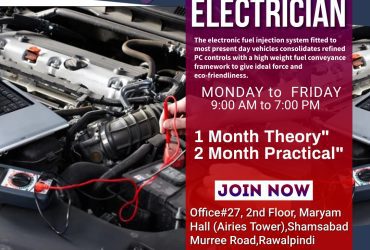Ad Details
-
Ad ID: 772037
-
Added: October 16, 2023
-
Sale Price: ₨123
-
Regular Price: ₨123
-
Location: Pakistan
-
State: Punjab
-
City: Rawalpindi
-
Phone: 03115193625
-
Views: 86
-
Website: www.icollegete.com
Description
ICTE
International College of Technical Education Pvt. Ltd
Head Office :
Office # 27, Second Floor, Maryam Shadi Hall Plaza
(Airies Plaza), Shamsabad, Murree Road,
Rawalpindi, Pakistan 46000.
Email : info@icollegete.com
Contact : 051-6122937, 0311-5193625, 0092-335-4176949
Hybrid and electric vehicle technology course provides students to the knowledge of hybrid and electric vehicles, and also teaches the principles of operation of vehicles. In this course, students learn technical drawing and design program. The aim of this course is to introduce students to power train.Hybrid electric vehicles are powered by an internal combustion engine and an electric motor, which uses energy stored in batteries. A hybrid electric vehicle cannot be plugged in to charge the battery. Instead, the battery is charged through regenerative braking and by the internal combustion engine.There are three main types of hybrid vehicle; full hybrids, mild hybrids and plug-in hybrids. A full hybrid (FHEV) can run on just the combustion engine (i.e. diesel/petrol), the electric engine (i.e. power from batteries), or a combination. The Toyota Prius is the most commonly known example of this.The main advantages of a hybrid electric motor include comparatively less gas usage and reduced CO2 emission than traditional gas or diesel-engine car or SUV. The most recent types of plug-in hybrid electric-hybrid cars are the most effective green automobiles, featuring a much-improved eco-friendly engine.The light vehicle industry is facing a shortage of engineering talent needed to retool for the use of electric drives as the primary source of motive power. Help fill that gap with Michigan Tech’s Hybrid Electric Vehicle (HEV) curriculum. The coursework provides advanced knowledge and hands-on labs in the design, analysis, control, calibration, and operating characteristics of HEVs. Whether you are a graduate or undergraduate student, you can integrate any number of these courses into your degree. Another flexible option: simply take courses as a non-degree seeking student.Hybrid vehicle technologies such as powertrains provide new opportunities to achieve better trade-offs in vehicle designs. These technologies can lead to improvements in driving performance and fuel economy. This online module presents an introduction to the current status of hybrid vehicles and basic technologies, along with an in-depth discussion about the control and design of split hybrid electric vehicles.
SYLLABUS
1 .Introduction of hybrid vehicles
History of hybrid vehicles
types of system architectures of hybrid vehicles
series hybrid
parallel hybrid vehicle
series –parallel hybrid vehicle
complex hybrid vehicle
characteristics and difference of HEV and PHEV
reasons behind development of HEV and different national fuel standards
power electronic in HEV
buck boost converter
three phase inverter
Live transmission explanation of Toyota prius
testing standards of HEV and PHEV (AIS Standards)
Battery Chemistry, Efficiency, Definition & its Parameters
Types of batteries – Pb Acid, Li-Po & Metal Air
Architecture- Cells, Modules & Packs
Battery Charging & Discharging Cycles
Use of Batteries in Hybrid Powertrain
Battery Modelling & Management System(BMS)
Alternative Energy Storage – Photovoltaic cells, Super-Capacitors, Fuel Cell
Demonstration Sessions-on experience on Battery Packs and BMS.
Electric Motors , Generators & Power Electronics
Electric Motors- AC/DC Motors/ Generators
Brushed DC Motor/ Brushless DC Motor- Torque Characteristics
Synchronous and Asynchronous AC Motor- Torque Characteristics
Reluctance Machines, Actuators & Capacitors
DC-AC & AC-DC Convertors
Practical design and calculation session on batteries and motors.














Leave a Comment
Your email address will not be published. Required fields are marked. *